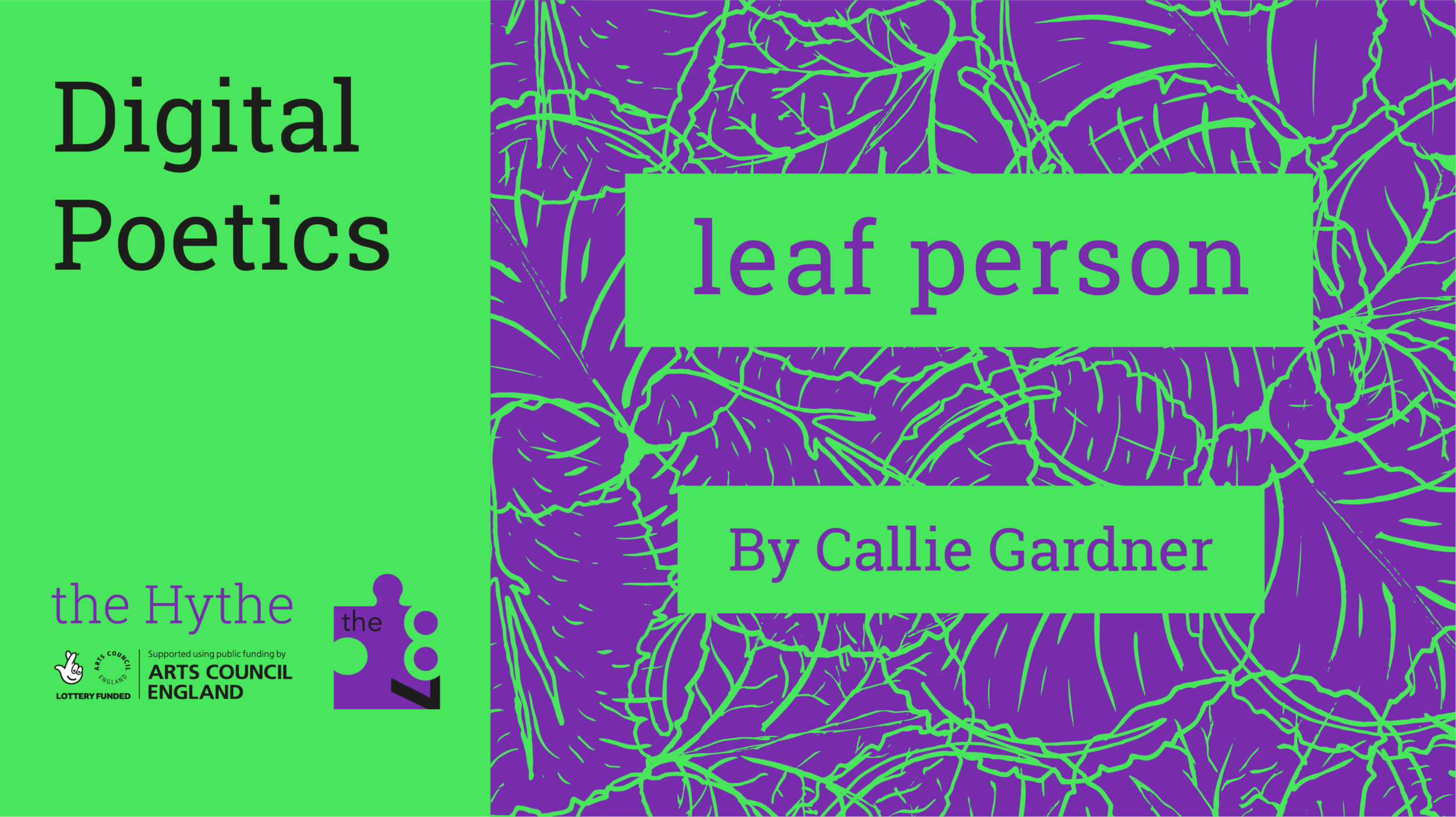Digital Poetics #14 leaf person: Callie Gardner
i.
walking in the woods, i read a leaf person,
a jenny haniver of the forest floor, their mouth
a ripped-up rictus of matter or paper, whichever worsens
the houseprice worser, when we all know bay leaves
they leave beliefs. the text offers you a tissue
but it’s merely a sad old approximation – a minimum
in this time –
unconscious, i swam into the kettle
of the mind’s eye, a floatsome, jectsome harp on
about the keynote squeaker, whose paws in questioning clasped
a slim vibration, a resonant phrase whose meaning tended
to be mistaken. narrow woods shot through the city
in vein attempts to judge themselves the heart of
the matter. and i felt like i knew, although
this was often assumed, that they offered arcane transport
from the arrived world, where we lay, stupefied, law-kissed,
milk-drunk, and awaiting the christ child to come with
my parcel. sorry. we missed you. said the little
fragmeant or ostrakon wedged into the rope-hole in the
floor of the treehouse.
worse than a lack of
awareness, it belies a fatal disconnection from the threads
that web together the world under the moon, motionable
and peripatetic by nurture, but guarded as a consequence
of the merry-go-town or upland, down. find the sun
just by putting your curious eye to the knot-hole
and breathing in as if to prepare to whistle.
ii.
you only need a little height, and pointed north,
for roof- and hilltops to typeset themselves so legibly;
how near, how apart they seem, their butch solemnity
an extensive revelation. as i stood under the spreading
tree, it rang, temple-domed, with noiseless paeans, the song
of souls, and i understood why they believed hearts
were souls, so quickly, strenuously did the ache harry
my chest-bones, held by morbid recognition. parks are fiddle,
cities are smut; grey ambivalence towards the long atrocity
still chokes each recreation. queens, kings, lords, and merchants.
dedicated ground, battle-soaked, brittle-titled, iron-clad, sign-posted.
in my dream,
i open my pocket knife, and then, upon waking,
fold it up again. where do dreams of bleeding
come from, when there’s no blood left to let.
it’s like tying a silk ribbon around a broken
tree branch, or maybe like burning sacred wood to
get rid of a bad smell. you can read
leaves, even if you cannot speak them; needle’s a
kind of leaf, although somehow it never seems vertible
enough. trees are a pyramid scheme anyway, free debt
to the earth; i am in arden too, said
death. what condition led you here? what’s your tendency?
when i was out of doors i was in
a better place, but masked revellers must be content.
it turned out the angry men were full of
goosefeathers and loose straw, and could be easily dispatched.
iii.
one wrapped in mould and bandages like cheese never
forgave those who extracted their vocabulary with a hook,
kept it in a canopic jar, leaving them sullen
on the slab until the resurrection, no leaves remaining
to be overturned in the interim. it’s about being
a belief person; get thee to a mummery, carry
on the show – more content, more argument, another verso.
caught between pages, trapped in the ecosystem, yet somehow
can’t make like a tree, and leaf.
the bookish
natural sun, desiring a return to form, a geometric
unravelling, each angle another sacred revelation, the shadows of
praying hands like ink on floorboards, soaking into fibrous
channels, minor rivers changing their names as their careers
advance, watering a clutch of lonely ogham scratches
in the margin of the sky. a text unweaves
in reverse, each letter made of leaves, each leaf
hoarding a library in each cell, which is where
the monks worked patiently at their washing of skins,
and their illuminations.
much later, turning cards over in
anonymous fascicles, characters unspool. a long-dead ox leaves bones
across the top of the page. we wait for
the rain to dry, the isles of its attention
drowning in day-air. with a start, i recognise some
character i know in the leaf-face, reversed, as elsewhere
in the building a bell is heard to ring.
*
Callie Gardner (they/them) is a poet and critic based in Glasgow. Their book-length poem naturally it is not. was published by The 87 Press in 2018, and their writing on poetry can be found at secondmoon.substack.com.
*
This publication is in Copyright. Callie Gardner, 2020.
The moral right of the author has been asserted. However, the Hythe is an open-access journal and we welcome the use of all materials on it for educational and creative workshop purposes.

